Israel Deploys Missile Boats In Red Sea In Response To Houthi Attacks
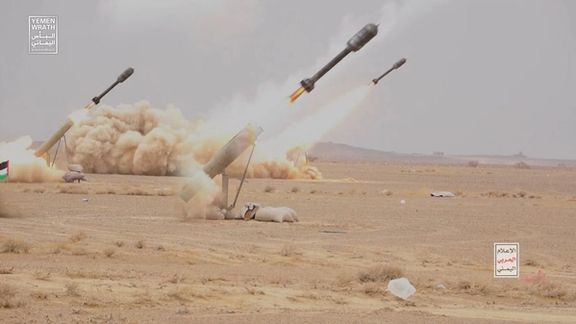
The Israeli military announced on Wednesday that it had deployed missile boats in the Red Sea in response to recent attacks carried out by the Iran-backed Houthi militia.

The Israeli military announced on Wednesday that it had deployed missile boats in the Red Sea in response to recent attacks carried out by the Iran-backed Houthi militia.
The deployment comes a day after the Houthi rebels claimed responsibility for launching attacks towards Israel and pledged to continue.
Images released by the Israeli military showed Saar-class corvettes patrolling near the Eilat port in the Red Sea. Israel views this region as a new front in the conflict as its ongoing war in Gaza has drawn retaliatory actions from Iran-aligned pro-Hamas forces throughout the region from Lebanon and Syria.
The Houthis disclosed that they had launched three drone and missile attacks against Israel since the beginning of the Hamas-Israel conflict which began on October 7 when thousands of Hamas militia invaded Israel killing at least 1,400 mostly civilians and kidnapping 239 more. Some have been intercepted by the US and Saudi Arabia and Tuesday's attacks also did not enter Israeli territory.
Like Iran's other proxies, the Houthis have vowed to carry out additional attacks in support of the Palestinians.
The Houthi movement, which seized control of Yemen's capital Sanaa in 2014 and holds significant territory in the country, considers itself part of the "axis of resistance" against Israel.
The Israeli military spokesperson emphasized that the primary focus remains on the Gaza Strip. "There are many actors in the region who operate as Iran proxies, such as the Houthis, who are trying to challenge us and distract us from the war in Gaza. We remain focused," said Rear Admiral Daniel Hagari.
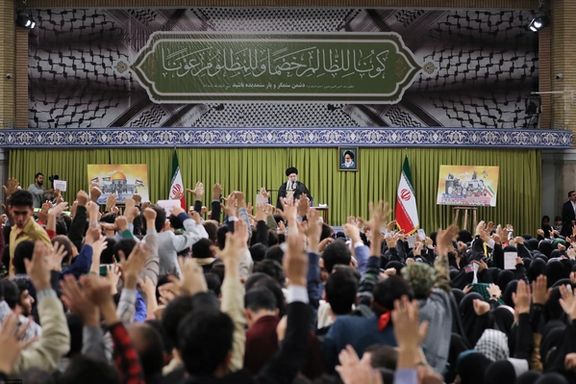
Iran's Supreme Leader has called on Muslim states to cease oil, food and goods exports to Israel to make it stop bombing Gaza following the October 7 Hamas attack.
Ali Khamenei made the remarks during a speech on Wednesday stating, "The bombings on Gaza must stop immediately ... the path of oil and food exports to the Zionist regime should be blocked."
Israel seeks to wipe out Tehran-backed Hamas, which rules Gaza, in retaliation for the terror attack last month that killed 1,400 people and saw more than 200 hundred taken hostage. The Israeli military has launched a retaliatory campaign that extended to a ground offensive last week. Hamas authorities in Gaza say more than 8,000 people have been killed, but the figure is not independently confirmed and can be part of the Islamist group’s psychological warfare.
"Muslim states must not cooperate economically with the Zionist regime, but denounce these catastrophes and crimes vociferously and without hesitation in all international forums. The scale and circumstances of what is going on must be clarified. The Zionist regime must be condemned, and the entire Muslim world must be mobilized against it,” Iran's authoritarian ruler added.
Iranian regime officials have repeatedly warned Israel of an escalation if it failed to end attacks against Gaza, threatening that Tehran’s proxies in the Middle East were ready to act. Attacks by Iran-backed militia groups in Iraq and Syria have increased against the bases hosting US forces in Iraq and Syria, while Hezbollah from Lebanon and Houthis from Yemen have also increased their missile launches against Israeli targets. The US military said Tuesday that over two dozen attacks were launched against its bases.
Khamenei repeated his customary rhetoric that the United States was complicit in Israel's "recent crimes against Palestinians".
"If it weren't for America's support and its military backing, the corrupt, fraudulent, and deceitful Zionist regime would have collapsed in the very first week” of Operation al-Aqsa Flood (Storm in Persian), the codename for Hamas’s multi-thronged surprise attack on Israel.
"The Islamic world should not forget that in the crucial issue of Gaza, those standing against the oppressed Palestinian nation were the United States, France and Britain," Khamenei said to chants of "Death to Israel" and "Death to America".
He defended the slogans and said, "Today, mass demonstrations are taking place even in the streets of the United States and Western countries, protesting against Israel and, in many cases, against the United States.”
British newspaper The Times revealed last week that Tehran is behind the protests as it tries to escalate tensions against its archenemy Israel amidst its war with Hamas. The demonstrations have also raised serious questions about the UK’s dealings with extremism in a year when the UK’s top security and political chiefs admitted that Iran remains one of the UK’s biggest threats.
Referring to reports about Iran’s involvement in stirring up unrest in the several countries through Gaza protests, Khamenei said that attributing the rallies to Iran is out of desperation, quipping that “perhaps these gatherings are the work of the London Basij and the Paris Basij!" Basij is the paramilitary volunteer-based wing of Iran’s Revolutionary Guards that organizes regime-sponsored rallies in Iran in line with the Islamic Republic’s policies and propaganda.
Khamenei's decision to publicly respond to these charges is interesting and shows his sensitivity to being accused of fomenting unrest in the West.
The octogenarian ruler intentionally ignored the fact that the Islamic Republic has several such bases in Europe that operate under the guise of Islamic centers and mosques and are directly run by representatives of Khamenei. Since earlier this year, at least two of these centers in German cities of Hamburg and Frankfurt as well as another one in the UK have been under scrutiny for their links to the regime and holding events to radicalize Muslims.
Israel, which Tehran refuses to recognize, has long accused Iran's clerical rulers of stoking violence by supplying arms to Hamas, controlling the Gaza Strip and to militants in Syria and Lebanon. Tehran says it gives moral and financial as well as logistical support to these groups.
"One of the shameless acts of the West is accusing Palestinian fighters of terrorism," Khamenei said, despite clear evidence that the latest Hamas invasion of Israel was designed to kill as many civilians as possible.
Iranian Foreign Minister Hossein Amir-Abdollahian, who is in Turkey to discuss the Hamas-Israel war in Gaza, reiterated threats of escalating the conflict unless Israel halts its offensive. During a Wednesday press conference with his Turkish counterpart Hakan Fidan, he said that if the war goes on, the resistance forces – regime's term for its regional proxies – will decide on another surprise attack.
Also on Wednesday, Iran’s Interior Minister Ahmad Vahidi described the attacks against US targets in Syria and Iraq as a natural reaction to Washington’s support for Israel in the war against Hamas. “Israel carries out these crimes in Gaza with the green light of the United States,” he said, stating that Muslims are concerned, and Americans may be targeted by whoever that deem the US as the main culprit. He claimed that such attacks are unrelated to Iran.
Updated and completed at 14:00 GMT

Iran and the United States went to the brink of war three times during the Presidency of Donald Trump, Iran’s former president Hassan Rouhani has disclosed.
Rouhani, speaking to the central council of the Moderation and Development Party this week, said that the first instance was when Iran shot down a US RQ-4A Global Hawk BAMS-D surveillance drone over the Persian Gulf in June 2019.
“On the day an American drone was targeted in the Persian Gulf, the Americans threatened us, and various messages were exchanged, ultimately, war was deliberately avoided,” Rouhani was quoted as saying by local media.
The second instance was when drones and missiles hit an oil facility in Saudi Arabia in September 2019, when Iran and its Houthi proxy forces in Yemen were blamed for the attack.
The third time Iran and the US went to the brink of war, Rouhani said, was when a US air strike killed Iran’s top extraterritorial military and intelligence operator, Gen. Qassem Soleimani in Baghdad on January 3, 2020. Iran retaliated by firing ballistic missiles at bases in Iraq hosting US forces five days later.
Rouhani stated that “They were saying that if you attack our forces, we'll target 52 points in Iran. However, we precisely targeted Ain al-Asad [air base], which was a planned operation. In total, we managed to pass through three phases of the war with the United States during the Trump era.”
Former President Donald Trump pulled out the Obama-era JCPOA nuclear accord in May 2018 and imposed tough economic sanctions against Iran, known as ‘maximum pressure’ policy.
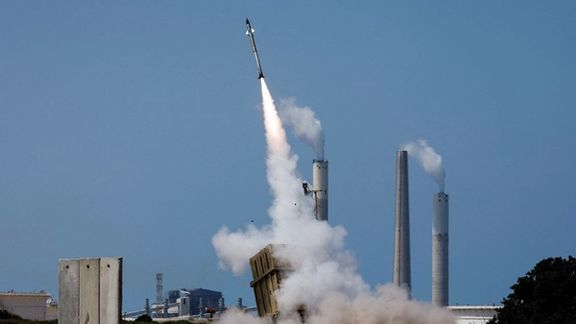
Yemen's Houthis, armed by Iran, launched ballistic missiles at Israel’s southernmost city Eilat on Tuesday, in what could signal the expansion of the Gaza war.
The Houthi rebels officially entered the Israel-Hamas war Tuesday, when their military spokesman announced that they had launched several ballistic missiles and drones aimed at Israeli targets.
“The Yemeni Armed Forces confirm that this operation is the third operation in support of our oppressed brothers in Palestine,” Brig. Gen. Yahya Saree said in a televised statement. “We will continue to carry out more qualitative strikes with missiles and drones until the Israeli aggression stops.”
The Houthis are yet another militant group backed by Iran. They’ve been effectively in a state of war with Saudi Arabia since 2015, and have claimed support for Palestinians since the Hamas terror attack on Israel on October 7.
The missile attack once again raises concerns that the war between Israel and Hamas could potentially involve other regional actors and set the whole Middle East ablaze.
Hezbollah in Lebanon published a third video of its leader Hassan Nasrullah on Tuesday, setting off another round of speculation that Hezbollah may be planning to declare war on Israel Friday.
Hassan Nasrullah is scheduled to speak at 3pm local time that day.
Tasnim News, a website affiliated with the IRGC, claimed on Tuesday that “America has sent messages to Hezbollah” to discourage them from entering the war with Israel.
The report is impossible to verify. It quotes “a senior source” from Hezbollah: “We made it clear that our duty is to be in the field, military, organizational, or intelligence. We’ll act with no warnings when it’s necessary. ”
The Houthis in Yemen, Hezbollah in Lebanon and Hamas and Islamic Jihad in Palestine are all part of an unofficial alliance that the Islamic Republic likes to call “the Axis of Resistance.”
It includes other groups in Iraq and Syria, which have also been busy targeting US forces in those countries.
On Tuesday, U.S. Secretary of Defense Lloyd Austin said in the last two weeks there had been at least 30 rocket and drone attacks “by Iranian-backed militias” against American troops in Syria and Iraq.
“[These] attacks must stop or else the United States will not hesitate to respond and protect its people,” Austin said.
The United States has deployed aircraft carriers to throw its weight behind Israel and deter the spread of the war. Iran has also expressed its desire to prevent the war from escalating further. However, Iranian Foreign Minister Hossein Amirabdollahian indicated that Tehran's proxies may take additional actions.
"They won't wait for anyone's advice,” he said “if the situation gets out of control, no party will be safe from its consequences."
Israel’s military says it has intercepted Houthi missiles and drones. Many experts say that attacks at this scale are more about sending a message than posing a significant military threat. However, concerns arise if a full-scale engagement erupts, potentially overwhelming Israel's air defenses.
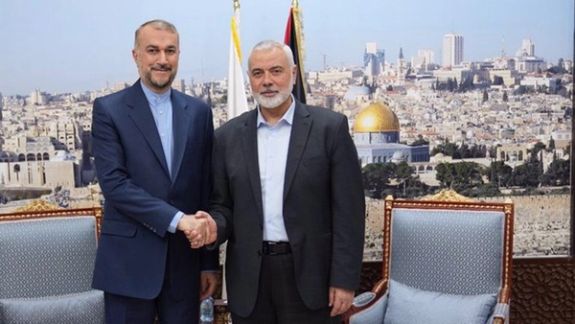
The Foreign Minister of Iran has held a meeting with Ismail Haniyeh, the head of the political office of Hamas Islamist militia group, in the Qatari capital Doha.
The meeting followed separate talks that Hossein Amir-Abdollahian had with the Emir and the Prime Minister of Qatar on Tuesday. It was the second official meeting between Iran and Hamas since the group, designated as a terrorist group by the US and several other countries, declared war against Israel.
Hamas launched the assault on October 7 with a barrage of at least 3,000 rockets launched at Israel and vehicle-transported incursions into its territory. Palestinian militants breached the Gaza–Israel barrier, targeting both military and civilian populations in neighboring Israeli communities. This included attacks on military bases, nearby towns, and even a music festival near Re'im. Over 350 Israeli soldiers and police officers, as well as more than 1,000 Israeli civilians, lost their lives during the wave of violence, with around 200 civilians and soldiers being taken as hostages to the Gaza Strip, among them, approximately 30 children. Israel has been pounding Gaza in retaliatory fire that has killed thousands of Palestinians.
Iran has expressed its full support for Hamas throughout the conflict and has issued warnings to the United States. Iran's leadership has stated that if the Israeli offensive against Hamas does not cease, it could escalate, potentially impacting American interests in the region.
Amir-Abdollahian, in a speech at the United Nations on Thursday, said that US forces in the Middle East would not be immune to the repercussions if the Israeli offensive against Hamas continues.
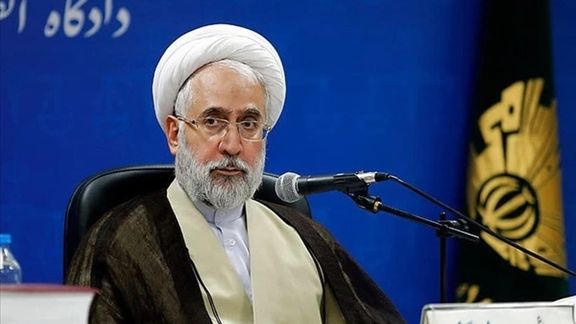
Iran’s Attorney General has officially designated any action promoting, strengthening, or supporting Israel online illegal.
The decision also encompasses providing services to platforms associated with Israel and facilitating the travel of Iranian citizens to the country through online means.
The Law on “Confronting Hostile Actions by the Zionist Regime Against Peace and Security”, was submitted to the parliament and approved during an open session in 2020. The legislation was recently updated by the Committee for Determining Instances of Criminal Content.
The update also “extends to any collaboration, interaction or exchange of information with both official and unofficial entities and individuals affiliated with the Israeli regime.”
The legislation reflects Iran's long standing stance as an opponent of Israel, whose destruction it has called upon for decades, reversing the good relations the countries shared before the revolution of 1979.
Iran has historically barred its athletes from competing against Israeli counterparts, leading to athletes intentionally losing games, forfeiting matches, or claiming injury under pressure from sports federation officials to avoid facing Israelis.
Supreme Leader Ali Khamenei has consistently lauded Iranian athletes who refuse to compete against Israelis and as recently as September 2021, encouraged them to persist in their stance, even if facing potential repercussions from international sports governing bodies.